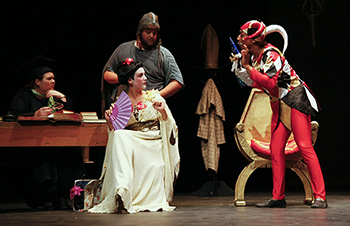Latest News Archive
Please select Category, Year, and then Month to display items
10 March 2022
|
Story Anthony Mthembu
|
Photo Unsplash
 The No Student Hungry team gearing up to start distributing food parcels to the selected students.
The No Student Hungry team gearing up to start distributing food parcels to the selected students.
The UFS is one of the many institutions of higher learning where food insecurity is an active issue. However, the
No Student Hungry Programme is one of the initiatives launched at the university to assist in fighting food insecurity at the institution.
The purpose of the programme
Since its inception in 2011, the initiative has assisted many students in acquiring a healthy meal. Additionally, the Food Environment Office also hands out food packages, so that students can continue to achieve academically. “We are trying to develop a healthy environment for students and make it easier for them to have a nice and healthy meal,” stated Annelize Visagie, who heads the Food Environment Office at the UFS. The Food Environment programme is spread out on all three campuses, each with its own facilitators. Furthermore, the programme mainly caters for students who are not funded by the National Student Financial Aid Scheme (NSFAS) but who are excelling academically. The abovementioned students apply for assistance online, and a list is then drawn up of students who receive assistance for the year.
Alternative solutions to keep the initiative running
On the Bloemfontein Campus, the No Student Hungry Programme will be catering for 200 students in the 2022 academic year, assisting them with a daily nutritious meal. Additional food parcels are also handed out to provide further assistance. “We give food parcels to the students on the list every Tuesday and Thursday at the Thakaneng Bridge,” Visagie highlighted. However, she argues that catering for the student population through this programme can be a challenge, as the demand for assistance is growing rapidly and the ability to assist is limited. The programme relies on partnerships and sponsors to assist the student body. In fact, the coordinators of the programme currently have a memorandum of understanding with Tiger Brands according to which they deliver around 100 food parcels for distribution.
In addition, the coordinators have put in place alternative measures to ensure that they can provide more food to students. “The
Kovsie Act Office, in partnership with the
Department of Sustainable Food Systems and Development, has started a food garden where healthy and nutritious produce are grown, in order to add value to the distribution,” she indicated. Although the programme can only assist to a point, students who are in desperate need of assistance are never turned away. In fact, the
Social Support Unit at Thakaneng Bridge usually assists students with food vouchers for a maximum of four days.
A commitment to teaching healthy eating habits
The programme is not only committed to curbing food insecurity, but also to ensuring that students have a healthy and balanced diet. As such, a booklet is being issued by the
Department of Nutrition and Dietetics in collaboration with the Department of Sustainable Food Systems and Development, which contains ways in which students can make a healthy meal using some of the ingredients offered in the food parcels.
“We want to teach students how to eat healthy in the cheapest way, because they don’t have a lot of money to buy expensive food products,” Visagie argued.
Drama students awarded National Arts Council bursaries
2016-05-04
 |
The National Arts Council (NAC) has awarded R100 000 to 10 Drama students at the University of the Free State (UFS). Eight years after its establishment in 2005, the NAC has partnered our university in funding academically-deserving students needing assistance with tuition. To date, our undergraduate students have benefitted from more than R800 000.
Prof Nico Luwes, Head of the Department of Drama and Theatre Arts, who applies to the NAC at the end of each year on behalf of students, welcomes the funds: “Quite a lot of our students would not have been able to complete their studies without assistance from the bursary scheme.”
As a result of this financial injection, South African schools also gain. “Some students then enrol for a higher education diploma, and they then teach Arts and Culture at schools. Hence, there is a whole new generation of Arts and Culture teachers who are now entering the school system,” said Prof Luwes.
Mbuyiselo Nqodi, a second-year BA Drama and Theatre Arts student, would not have been able to enrol at the university in 2015, had it not been for the NAC. “Without the bursary, I would not have been admitted into the university. It helped a lot because R10 000 can go a long way.”
Pursuing its mandate to support and develop South Africa’s arts, culture and heritage sector, the NAC awarded 117 bursaries to arts students and tertiary institutions for the year. A total of R5 million has been allocated for 2016, a 10% increase on the previous financial year.
According to the NAC Chief Executive Officer, Rosemary Mangope, one of the aims of the NAC is to provide support to students who will contribute to the arts and culture industry in a meaningful and sustainable manner.